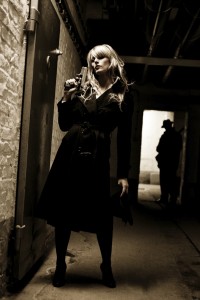 Nearly five years ago, the late Paul Sussman, Egyptologist and thriller writer, told me on my Arvon Foundation course that INCEPTIO was high-concept.
Nearly five years ago, the late Paul Sussman, Egyptologist and thriller writer, told me on my Arvon Foundation course that INCEPTIO was high-concept.
I didn’t really have a clue what that meant, but I nodded and thanked him. Did it mean it was highbrow? No, despite all the Roman content, it was an adventure story, a thriller, a story of female empowerment, if you want to be grand, but not the Great British Novel.
I didn’t think much more about this until a reader described INCEPTIO as ‘Falco meets The Hunger Games’. Flattery indeed! What if those two tropes were combined? Did that mean high concept, or just a bit barmy?
Next, Sue Cook, the writer and TV personality, said my books were so visual, they were crying out to be made into films. Was this what was meant by high-concept? Coincidently, I read an article on the subject and was a little dismayed to find it meant writing in order to pitch it succinctly, i.e. a simplistic story. Now whatever my stories are, I don’t think they’re simplistic! Deflated, I decided to ignore ‘high-concept’.
 However, I kept seeing the term bandied about and remembering Paul’s comment all those years ago, my curiosity rekindled. As I read on, I discovered that few agreed on a definition of high concept. Was it just a method of pitching or had it widened into a way of describing certain types of stories?
However, I kept seeing the term bandied about and remembering Paul’s comment all those years ago, my curiosity rekindled. As I read on, I discovered that few agreed on a definition of high concept. Was it just a method of pitching or had it widened into a way of describing certain types of stories?
As posts and articles popped up along with ripostes and agreement, arguments and counter-arguments, I noticed that new definitions were emerging.
So I propose the following requirements for high concept:
The premise should be both original and unique
It’s not necessary to reinvent the wheel. A traditional subject, but with an unexpected approach/environment/switch qualifies the material as original. However, uniqueness means being one-of-a-kind, first time, and incomparable.
Sparks a ‘what if ‘ question
What if X or Y happened? What if Z still existed? If it time had gone off on an alternative path? A succinct question for the back cover!
Highly entertaining
Gets the reader turning the pages, eager or even desperate to know what happens next. If they are interested purely on an intellectual basis, then although the idea may be interesting, engaging, and curious, it’s not entertaining.
Possesses a clear emotional focus
The emotional stakes must be high and immediate. Simply put, the story should grab the reader at a primal level and not let go: not soft and gentle feelings, but fear, joy, hate, passionate love, rage, despair, betrayal.
The story has to have mass appeal
An easy to grasp idea with a heart or essence that everybody can see, understand and engage with clearly and immediately.
Highly visual
The reader (or listener) should be able to imagine the action scenes in her head as the writer describes them. Is it filmic? And in colour? Books with cinematic imagery are almost always high-concept stories.
You can probably see where I’m going with this… 😉 Readers have been kind enough to report all these elements in the Roma Nova books. Perhaps I should now be content to call them high concept. Or should I think again?
Alison Morton is the author of Roma Nova thrillers, INCEPTIO, PERFIDITAS and SUCCESSIO. The fourth book, AURELIA, is now out.
Find out Roma Nova news and book progress before everybody else, and take part in giveaways by signing up for her free monthly email newsletter.













Same problem. Have seen that term and never got a really good feel for what was meant. It seemed to be used in a variety of ways depending on the source.
Exactly! I thought I’d better try and herd these loose thoughts in to a pen to try to make sense of them, at least for myself.
I’ve never understood this term either, Alison, but then I still don’t understand what a literary novel is, as opposed to a commercial one. Surely all novels are commercial in that the author needs to sell them and hopefully make some money. The word ‘literary’ when it comes to authors describing their work always sounds pretentious. So ‘high concept’ for the Roma Nova series? Couldn’t possibly comment! 😉
High concept veers towards the commercial, marketable story – I think it would be unrealistic to think otherwise, but it’s a slippery label with no sticking power.